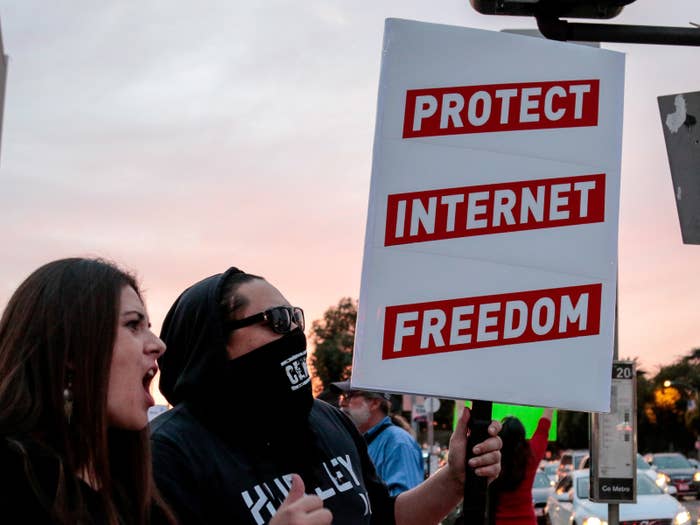
The Justice Department on Sunday announced that it was suing California over its new net neutrality law, calling the state's new internet protections unconstitutional.
The announcement came almost immediately after California's net neutrality bill was signed into law by Gov. Jerry Brown. The legislation will prevent broadband and wireless companies from throttling and manipulating internet access, and effectively restores Obama-era internet protections that were repealed by the Trump administration earlier this year.
Approved by state lawmakers in August, the bill prohibits internet providers from slowing down websites, charging premiums for higher-quality streaming, and demanding payments from internet companies to reach subscribers. It also bans zero-rating data, a practice in which internet providers exempt certain websites or services from counting toward a customer's data usage.
"Net neutrality, at its core, is the basic notion that we each get to decide where we go on the internet, as opposed to having that decision made for us by internet service providers,” Democratic state Sen. Scott Wiener, who authored the measure, said in a statement after Brown's signing Sunday. “Today marks a true win for the internet and for an open society.”
Brown's approval brings to an end a bitter, intense feud in California between telecom giants like AT&T and Verizon, who called the state's new rules "extreme," and net neutrality advocates who have championed the legislation as "vital" for consumers.
It's also the latest example of the state pushing back against the Trump administration, opening up another legal battle with the federal government, which has already sued California for trying to get around the president's policies on immigration and climate regulation.
In a statement issued within hours of the bill's signing Sunday, the Justice Department said it would take California to court over the new law, under the argument that only the federal government, and not states, has the power to regulate the internet.
“Once again the California legislature has enacted an extreme and illegal state law attempting to frustrate federal policy," Attorney General Jeff Sessions said in the statement. "The Justice Department should not have to spend valuable time and resources to file this suit today, but we have a duty to defend the prerogatives of the federal government and protect our Constitutional order. We will do so with vigor. We are confident that we will prevail in this case — because the facts are on our side.”
In response, California Attorney General Xavier Becerra tweeted that the state “will not allow a handful of power brokers to dictate sources for information or the speed at which websites load.”
While the #Trump Administration continues to ignore the millions of Americans who voiced strong support for #netneutrality rules, #California will not allow a handful of power brokers to dictate sources for information or the speed at which websites load. https://t.co/I5BWtrZIA1
A spokesperson for Brown declined to comment Sunday, saying “we will let the Governor’s signature speak for itself on this bill.”
Telecommunications companies like AT&T have decried California's new restrictions, arguing that the net neutrality law will lead to higher internet and cellphone prices.
“The ban on zero-rating could lead to an increase of $30 a month on the bills of low-income Californians and the ban on interconnection fees could lead to a reduction in investment in California by more than $1 billion a year,” an AT&T spokesperson told BuzzFeed News in August. “We support an open internet, but this bill moves us no closer to that.”
Other states, including Washington and Oregon, have enacted similar laws to restore net neutrality, but California is the first to fully reinstate the Obama-era regulations repealed by the Federal Communications Commission in June.
“Not only is California’s internet regulation law illegal, it also hurts consumers. The law prohibits many free-data plans, which allow consumers to stream video, music, and the like exempt from any data limits,” Trump's FCC chair, Ajit Pai, said in a statement Sunday. “They have proven enormously popular in the marketplace, especially among lower-income Americans. But notwithstanding the consumer benefits, this state law bans them.”
